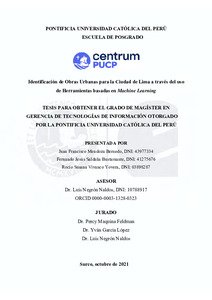| dc.contributor.advisor | Negron Naldos, Luis Alfredo | |
| dc.contributor.author | Mendoza Bernedo, Juan Francisco | |
| dc.contributor.author | Saldaña Bustamante, Fernando Jesus | |
| dc.contributor.author | Vivanco Yovera, Rocio Susana | |
| dc.date.accessioned | 2021-11-17T15:59:46Z | |
| dc.date.available | 2021-11-17T15:59:46Z | |
| dc.date.created | 2021 | |
| dc.date.issued | 2021-11-17 | es_ES |
| dc.identifier.uri | http://hdl.handle.net/20.500.12404/20918 | |
| dc.description.abstract | La presente investigación tiene como objetivo utilizar la tecnología basada en machine
learning, para la identificación de obras urbanas en la ciudad de Lima. La posibilidad de
extraer y analizar información de medios sociales mediante el análisis de sentimientos,
también conocido como minería de opinión (opinion mining), es, para Liu (2015), un campo
de estudio que se centra en analizar las opiniones que expresan o implican sentimientos
positivos o negativos. Para abordar esta problemática se propone un modelo para la
clasificación de mensajes de Twitter de forma automática, a fin de comprender cuál es la
intención que tiene el usuario cuando publica un mensaje sobre las obras urbanas en la ciudad
de Lima, en especial pistas, parques y veredas, además de identificar la ubicación de estas
obras en sus diferentes distritos. La investigación permitió reconocer patrones de comportamiento
que son de gran importancia para la Municipalidad de Lima, debido a que, al tener identificada
la problemática de las obras urbanas por distritos, podrá plantear estrategias para priorizar
obras de manera anticipada y así poder planificarlas para su ejecución en el periodo municipal.
Los resultados obtenidos utilizando el algoritmo de clasificación supervisada support vector
machine (SVM) muestran valores de aciertos del modelo de alrededor del 78% en análisis de
sentimientos. Se realizó una primera clasificación de distritos que necesitan urgentemente de
obras urbanas, disgregada en tres tipos: parques, pistas y veredas. Los resultados generales
del modelo son buenos en comparación con las investigaciones de otros autores como Aiala
et al. (2017). | es_ES |
| dc.description.abstract | This research is called "Identification of urban works for the city of Lima through the use of
tools based on Machine Learning", it has as goal the use of technology based on Machine
Learning for the identification of urban works in the city of Lima. The possibility of
extracting and analyzing information from different social media through sentiment analysis,
also known as opinion mining; that for Liu (2015), is a field of study that focuses mainly on
analyzing the opinions that express or imply positive or negative feelings. To address this
topic, a model is proposed for the automatic classification of Twitter messages to try to
understand the intention of the user when he publishes a message about urban works in the
city of Lima, especially roads, parks, and sidewalks, additionally it is necessary to identify
the location of urban works in the districts of Lima. This research allowed to identify patterns
of behavior that are of great importance for Lima Municipality, because by having identified
the problem of urban works by districts, it will allow them to propose strategies that allow
prioritizing the districts with demand for urban works in advance and be able to plan them for
execution in the governance period. The results obtained using the Support Vector Machine
(SVM) supervised classification algorithm, show us values of correctness of the model
around 78% in sentiment analysis. A first classification of districts was made with the
urgently needs urban works and has been classified into the three types of urban works:
parks, tracks, sidewalks. The general results of the model are good when comparing the
research of other authors such as Aiala et al. (2017). | es_ES |
| dc.language.iso | spa | es_ES |
| dc.publisher | Pontificia Universidad Católica del Perú | es_ES |
| dc.rights | info:eu-repo/semantics/openAccess | es_ES |
| dc.rights.uri | http://creativecommons.org/licenses/by-nc-nd/2.5/pe/ | * |
| dc.subject | Inteligencia artificial | es_ES |
| dc.subject | Industria de la construcción--Innovaciones--Lima | es_ES |
| dc.title | Identificación de obras urbanas para la ciudad de Lima a través del uso de herramientas basadas en Machine Learning | es_ES |
| dc.type | info:eu-repo/semantics/masterThesis | es_ES |
| thesis.degree.name | Maestro en Gerencia de Tecnologías de Información | es_ES |
| thesis.degree.level | Maestría | es_ES |
| thesis.degree.grantor | Pontificia Universidad Católica del Perú. CENTRUM | es_ES |
| thesis.degree.discipline | Gerencia de Tecnologías de Información | es_ES |
| renati.advisor.dni | 10788917 | |
| renati.advisor.orcid | https://orcid.org/0000-0003-1328-0323 | es_ES |
| renati.author.dni | 43977334 | |
| renati.author.dni | 41275676 | |
| renati.author.dni | 03898287 | |
| renati.discipline | 612167 | es_ES |
| renati.juror | Percy Samoel Marquina Feldman | |
| renati.juror | Yván Jesús García López | |
| renati.juror | Luis Alfredo Negron Naldos | |
| renati.level | https://purl.org/pe-repo/renati/level#maestro | es_ES |
| renati.type | https://purl.org/pe-repo/renati/type#tesis | es_ES |
| dc.publisher.country | PE | es_ES |
| dc.subject.ocde | https://purl.org/pe-repo/ocde/ford#5.02.04 | es_ES |






